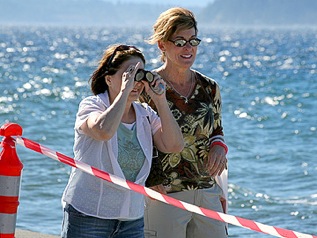Jun 2011
Seal Sitters to participate in celebration of Jack Block Park
Jun/17/11 11:48 AM
For the first time in its history, the beach at Port of Seattle’s Jack Block Park will be officially open to the public on Friday, June 24th with an opening celebration from 5-7:30 with local dignitaries. While the evening’s ceremony is open to the public, you must make a reservation by email or call 206-787-3009. Read more details about the opening evening events in the West Seattle Blog. The celebration will continue throughout the weekend with the NW Paddling Festival on Saturday and Sunday, June 25-26. This will be a very lively weekend with kayak racing, kayak technique workshops, kayak and watersport related gear retailer booths.
Seal Sitters will have a table at the event in hopes to educate the public that for years seals of all ages have rested on these previously inaccessible beaches and the old dock. We will be stressing the need to observe from a respectable distance any and all marine mammals encountered at the Park. Please visit our booth and enjoy this high energy event. Click here to find out more about the festival promoted by Alki Kayak Tours and Sea Kayaker Magazine.
Seal Sitters will have a table at the event in hopes to educate the public that for years seals of all ages have rested on these previously inaccessible beaches and the old dock. We will be stressing the need to observe from a respectable distance any and all marine mammals encountered at the Park. Please visit our booth and enjoy this high energy event. Click here to find out more about the festival promoted by Alki Kayak Tours and Sea Kayaker Magazine.
Seal Sitters new volunteer training set for July 10
Jun/17/11 11:14 AM

If you are interested in attending, please rsvp as we cannot exceed the room capacity of approximately 70 people. Current volunteers are welcome to attend as well, space permitting, and we can always use a hand with setup, breakdown, etc. We look forward to seeing you there!
Seal Sitters' signage project completed
Jun/14/11 08:09 PM

Seal Sitters would like to give huge thanks to Joe Neiford, Emily Fuller and Dewey Potter of Seattle Parks and Garry Owens of the Department of Neighborhoods for their help in making this project a success - and, of course, the Department of Neighborhoods for granting us this generous in-kind award!
Molting elephant seal at Golden Gardens
Jun/03/11 07:30 PM
(see update end of story) Seal Sitters responded to calls yesterday of an injured seal at Golden Gardens in Ballard. The first call came in about 3:30 pm but the seal could not be found. Another report came in approximately 7 pm that a seal with “stomach wounds” was on the boat launch at Shilshole Marina. Our responder could not find the seal there, however, noticed a group of people further down the sandy beach who were too close to what turned out to be an elephant seal. Our responder established a large tape perimeter on the beach and proceeded to get a health assessment through observations and video/still images. The seal was obviously going through an unusually difficult molt, but was lying on his/her stomach - hence there was no way to determine if there were indeed wounds or if it was fur and skin missing from the molting process. The seal was alert, but thin and exhibiting typical elephant seal behavior of flipping sand on sides and back. Volunteers watched over the seal (unable to determine sex, but could be either female or juvenile male) until after dark and bystanders were respectful, concerned and inquisitive.
We have embedded a short video clip of the seal who was still on the beach at daybreak this morning. Most of the photos are a bit too gruesome to share since elephant seals’ catastrophic molt (shedding skin and fur all at once) is an ordeal where people often think they are dying. This seal was undergoing a particularly horrific molt with what appeared to be related health issues. The seal returned to the water late morning as the beach became busy with noisy onlookers. One could see the animal’s stress level rise significantly as people talked and moved about and were in the water just on the other side of the protective yellow tape barricade. Please remember that while NOAA recommends staying 100 yards away from any marine mammal on shore, the network tries to establish a reasonable perimeter that protects the seal while not drastically inconveniencing urban beachcombers. This, however, does not mean that it is appropriate to create disturbances close to the tape. Given the extreme low tides and expected nice weather this weekend, we hope this seal finds a quieter place to rest. If you see the seal, please call our hotline @ 206-905-SEAL (7325) immediately and ask people to observe quietly from a distance.
UPDATE: Review of still images by marine mammal experts Friday morning determined that this seal is suffering from at least a moderate case of Northern Elephant Seal Skin Disease (NESDD), which can cause secondary infections and septis and, if left untreated, can be fatal. Sometimes referred to as “scabby molt”, almost all reported cases have been found in 1 - 2 year old elephant seals. Plans had been set into place to relocate the animal to a quieter spot, obtain blood samples and, at the very least, scrub the skin with an anti-bacterial topical solution. Since Washington State has no marine mammal rehab facility, efforts were being made to find a regional facility who might be able to hold and treat the seal more long-term with antibiotics. Unfortunately, before the biologist could arrive to relocate the seal, he/she returned to Puget Sound. Video of the seal leaving the beach further supported the conclusion that the seal was extremely weak and compromised.
UPDATE: Review of still images by marine mammal experts Friday morning determined that this seal is suffering from at least a moderate case of Northern Elephant Seal Skin Disease (NESDD), which can cause secondary infections and septis and, if left untreated, can be fatal. Sometimes referred to as “scabby molt”, almost all reported cases have been found in 1 - 2 year old elephant seals. Plans had been set into place to relocate the animal to a quieter spot, obtain blood samples and, at the very least, scrub the skin with an anti-bacterial topical solution. Since Washington State has no marine mammal rehab facility, efforts were being made to find a regional facility who might be able to hold and treat the seal more long-term with antibiotics. Unfortunately, before the biologist could arrive to relocate the seal, he/she returned to Puget Sound. Video of the seal leaving the beach further supported the conclusion that the seal was extremely weak and compromised.








